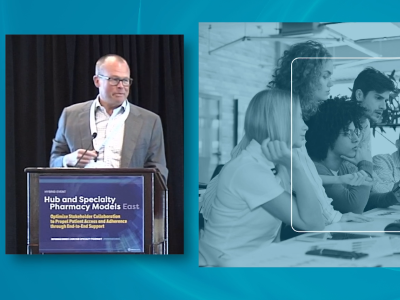Video Session: The Data-driven, Patient-focused Hub
It’s a surprisingly common misconception that the patient experience relating to initiating specialty treatments is straightforward once a...
4 min read
 CareMetx
:
Feb 29, 2024 1:19:09 PM
CareMetx
:
Feb 29, 2024 1:19:09 PM

Biologics are now the fastest growing category of drugs, with revenue increasing at a compound annual growth rate (CAGR) of 12.5% over the past five years vs 1.3% for small molecule drugs. As Dr. Jason Shafrin of the Center for Healthcare Economics and Policy at FTI Consulting shared in a recent Prescription for Better Access podcast, the FDA approved 20 biologics in 2023, representing a dramatic increase in activity.
With many early-entrant biologics facing loss of exclusivity soon, competition from biosimilars is expected to skyrocket. In fact, IQVIA estimates that molecules at risk of biosimilar competition represent $38 billion of invoice spending. Recently launched biosimilars reached upwards of 60% of the molecules’ volume in just three years—a clear sign that uptake is accelerating.
While biosimilars are gaining traction, launching these products can be more challenging than introducing small molecule therapeutics. In the Prescription for Better Access podcast, the group discusses the dramatic range seen in biosimilar adoption rates— referencing an impressive 80% uptake for one, compared to a mere 5% for another- both within a year on the market. It's a clear signal: the success of biosimilars hinges on effective patient support programs from the start. As a result, it’s essential for biosimilar manufacturers to assess prospective hub partners carefully, ensuring they can obtain the support needed to overcome the inherent obstacles in introducing a biosimilar and achieving commercial success.
To listen to the episode in full, click below to play.
Why Are Biosimilars Challenging to Launch and Support?
Any drug product will require different levels of support and investment at various stages of its lifecycle, but the launch period is especially critical. Getting a new biosimilar off to a good start in the commercial market paves the way for long-term adoption and success. However, many challenges can jeopardize an effective launch.
The Impact of Branded Expectations on Provider Acceptance: Healthcare providers (HCPs) might be reluctant to adopt a biosimilar if they have concerns about its efficacy or safety relative to the branded version. Providers who have prescribed the branded version with good results will likely bring those same expectations to the biosimilar. Unless providers feel that the biosimilar product is on par with its branded counterpart in terms of safety and efficacy, it likely won’t gain traction with providers.
Coverage Limitations: Accessing a biosimilar can be difficult since payer acceptance of these alternatives is somewhat limited. It takes time for payers to determine how they’ll cover an emerging therapy like a biosimilar, so in the early stages, patients might face coverage gaps. In turn, that can hamper uptake by providers.
Logistical Issues: As with any new therapeutic, helping HCPs feel confident prescribing a biosimilar over a branded product demands a seamless, efficient process that works within the provider’s existing workflow. Other factors being equal, the provider might avoid prescribing a drug that involves disruptions or deviations from their standard operational processes.
High Costs: While biosimilars typically aim to reduce costs for payers and patients, often the manufacturer’s costs to produce the drug aren’t much different from those of the branded version. With some payers favoring higher-priced options that offer rebates, biosimilar manufacturers face even greater margin pressures.
Strong Competition: A biosimilar often faces competition from multiple drug alternatives, all with little profile differentiation. In this environment, manufacturers depend even more heavily on the provider’s acceptance of the drug and ability to secure coverage to ensure successful script pull-through.
Choosing the Best-Fit Hub to Support a Biosimilar
To help providers gain the assurance they need to prescribe a new biosimilar—and ensure patients can access and afford these novel therapeutics—specialty manufacturers often look to a hub to support their biosimilars both at and after launch. Even if a manufacturer has experience using a hub for a branded biologic or a small molecule drug, the nuance of commercializing a biosimilar makes the hub decision more critical and more involved.
As a digital Hub that’s supported biosimilar brands in immunology, oncology, and ophthalmology, CareMetx understands the unique needs of a biosimilar patient support program. Our team has developed purpose-built biosimilar solutions that help manufacturers launch these drugs successfully, especially in complex scenarios that involve both prescription and medical benefits.
In working with leading biosimilar brands, CareMetx has found the following factors to be most important to manufacturers seeking a hub to support these new therapeutics.
Learn More
CareMetx is uniquely equipped to help manufacturers launch and support a biosimilar brand throughout its dynamic lifecycle. Through our experience supporting leading biosimilar brands, automated benefit verification processes that deliver results in seconds in most cases, integration with the provider’s workflow, and flexible and cost-effective biosimilar Hub model, we help biosimilar manufacturers achieve commercialization success. Contact CareMetx to schedule a demo or learn more about our innovative Biosimilar Essentials Program.
For a deeper dive into how biosimilars are improving patient access to therapeutics and some of the challenges encountered along the way, listen to the recent episode of the Prescription for Better Access podcast, co-hosted by CareMetx Executive Chairman, Mark Hansan.

It’s a surprisingly common misconception that the patient experience relating to initiating specialty treatments is straightforward once a...

When a manufacturer launches a patient support program, choosing the right Hub provider to partner with is only part of the equation. From there,...

Leading manufacturers recognize that to ensure an optimal patient experience, you need to improve the experience for healthcare providers (HCP).